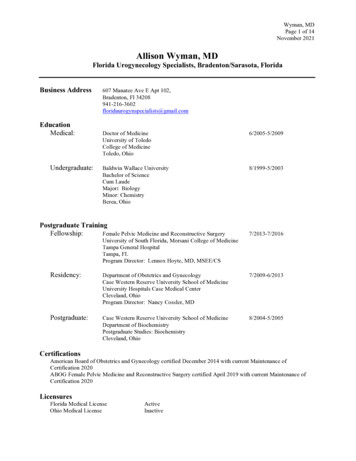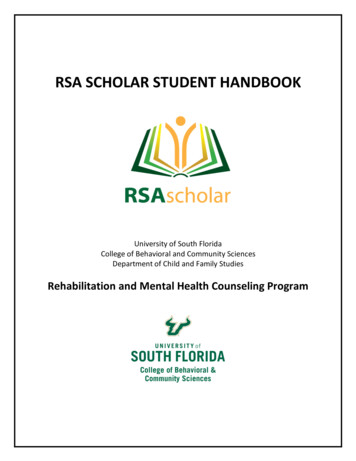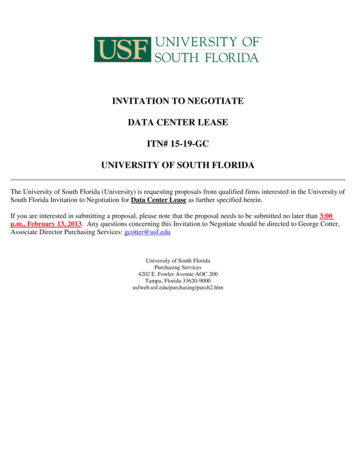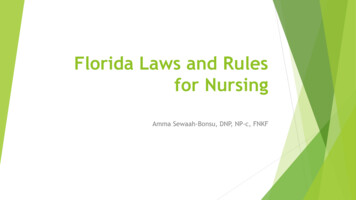
Transcription
View metadata, citation and similar papers at core.ac.ukbrought to you byCOREprovided by UNF Digital CommonsFlorida Public Health ReviewVolume 2Article 17July 2005University of South Florida College of PublicHealth: Reflections on Doctoral Education 1987 2005Follow this and additional works at: https://digitalcommons.unf.edu/fphrPart of the Public Health Commons, and the Social and Behavioral Sciences CommonsRecommended Citation(2005) "University of South Florida College of Public Health: Reflections on Doctoral Education 1987 - 2005," Florida Public HealthReview: Vol. 2 , Article 17.Available at: is Article is brought to you for free and open access by the BrooksCollege of Health at UNF Digital Commons. It has been accepted forinclusion in Florida Public Health Review by an authorized administratorof UNF Digital Commons. For more information, please contact DigitalProjects. July 2005 All Rights Reserved
et al.: University of South Florida College of Public Health: ReflectionsUniversity of South Florida College of Public Health:Reflections on Doctoral Education 1987 - 2005Karen M. (Kay) Perrin, PhDRobert J. McDermott, PhDAbstractThe establishment of doctoral training is a milestone in the chronological and intellectual development of anacademic institution. The University of South Florida College of Public Health (COPH) admitted its first doctoralstudent in the fall of 1987 and graduated its first two in 1992. The USF COPH will top the century mark in PhDgraduates in 2005. This article summarizes the history of doctoral education at the USF COPH and provideshighlights of a few of the nearly 100 PhD graduates now making a mark on improvement of public health research,education, and practice – in Florida, and elsewhere.Florida Public Health Review, 2005; 2: 92-95BackgroundThe University of South Florida College ofPublic Health (USF COPH) was established in July1984 with an initial enrollment of 100 students. Untilcompletion of its current building in December 1991,its residence was in a vacant section of the FloridaMental Health Institute. Today, the USF COPHhouses an auditorium, multi-purpose classrooms withstate-of-the-art audiovisual equipment, a distanceeducation studio, computer classrooms, 17laboratories, and in addition to its largeadministrative and student support staff, more than91 faculty members who provide education, researchand service that impacts local, state, national andglobal public health. Since its inception, the USFCOPH has graduated 1,975 students and has a currentenrollment of approximately 495 students in MPH,MSPH, or MHA programs (some jointly with otherdegree programs on the USF campus), and 91 fulltime and part-time doctoral students seeking the PhDdegree. The USF COPH is fully accredited by theCouncil on Education in Public Health (CEPH), anindependent agency that is recognized by the U.S.Department of Education as the primary accreditingbody for schools and colleges of public health. TheCOPH was recently re-accredited in June 2004 fortheseven-yearmaximumpermittedbyreaccredidation cycles. Today there are five academicdepartments in the USF COPH: The Department of Community and FamilyHealth, whose activities seek improvement ofthe health status of the family through aninterdisciplinary approach of preventive,curative and rehabilitative health care nsothatpublichealthresponsibilities can be carried out in thecontext of diverse settings. The Department of Environmental andOccupational Health, whose offerings includeteaching and research in the areas ofenvironmental health, industrial hygiene,Florida Public Health Review, 2005; 2: 92-95http://publichealth.usf.edu/fphrPublished by UNF Digital Commons, 2005safetymanagement,toxicology,andoccupational health. The Department of Epidemiology andBiostatistics, whose students come frombackgrounds in the medical, biological, social,and quantitative sciences, and are prepared forcareers in the discovery and interpretation ofthe person, place, and time factors thatinfluence disease causation and levels ofhealth status. The Department of Health Policy andManagement, whose students are prepared forcareers in Health Organizations andManagement, Health Policies and Programs,and International Health Management,including skill development for all aspects oforganization, financing and delivery of healthservices. The Department of Global Health, wherestudents interested in global health challengesand the emerging infectious diseasesworldwide are trained for work that may takethem across national borders.Doctoral Graduates of the USF COPH (1992present)The USF COPH offers the PhD degree, adegree historically known for its rigorous focus onresearch and quantitative and qualitative sciences.Beginning with 1992, a total of 99 students havereceived their doctoral degrees from the USF COPH.The first PhD student was admitted to the USFCOPH in 1987 (Susan W. Goodrich); the firstdoctoral student graduates were in 1992 (Jane P.Carver and Eileen M. Emery-Filizof); and the peakyear for PhD graduates was 2003 with 13 graduates(Table 1 and Table 2).921
Florida Public Health Review, Vol. 2 [2005], Art. 17Table 1. Distribution of PhD Graduates by Year14Table 3. Top Six Residential Locations of PhDGraduates60401220100FL8MDTXGANCVATop 6 99319920# of studentsTable 2.Number of PhD Graduates byDepartment 1992-present403020100CFHEOHEPIHPMApproximately 56 PhD of the 99 USFCOPH PhD program graduates still live and work inFlorida, with 32 residing in the Tampa / St.Petersburg area. Table 2 shows the top six stateswhere USF COPH doctoral graduates now reside.Other PhD graduates of the USF COPH are involvedin public health endeavors in Alabama, Alaska,California, Illinois, Indiana, Iowa, Maine,Massachusetts, Michigan, Minnesota, New Mexico,New York, Ohio, Washington, and West Virginiaplus Puerto Rico (Table 3).Florida Public Health Review, 2005; 2: alcommons.unf.edu/fphr/vol2/iss1/17The USF COPH PhD graduates areemployed in a variety of settings across the UnitedStates and its territories. Several graduates areemployed by the federal government, including theCenters for Disease Control and Prevention and otherelements of the U.S. Public Health Service. Othershave accepted faculty positions at universities, fromthe University of Alaska-Anchorage, to theUniversity of Puerto Rico, and institutions of highlearning in numerous other states. Four graduates areemployed at Florida universities, not including theadditional18 who are employed by a college or centerat the University of South Florida. Their positionsinclude the following working titles: post-doc fellow,director, research assistant professor, researchassociate professor, and the full range of adjunct andtenure-earning faculty. Six are employed as full-timefaculty members at the USF COPH.Profiles of Selected PhD GraduatesWhereas it is not feasible to profile everyUSF COPH doctoral graduate, the followingexamples illustrate the diversity of the PhD graduatessince the inception of the program.Roy Beck, MD, PhD, completed hisdoctorate in 1993 from the Department ofEpidemiology and Biostatistics. He is the founder ofthe Jaeb Center for Health Research, located near theUSF campus in North Tampa. Currently, he has sixprojects funded by the National Institutes of Health:(1) Longitudinal Optic Neuritis Study; (2) PediatricEye Disease Investigator Group; (3) Cornea DonorStudy; (4) Diabetes in Children Research Network;(5) Diabetic Retinopathy Clinical Research Network;and (6) Web-Based Methods Resource Center forEye Disease Trials. On his curriculum vitae, Dr.Beck lists 155 publications in peer-reviewed journalsrelated to his valuable work on optic neuritis andnumerous other ophthalmic conditions.Danice K. Stone Eaton, PhD, graduated in2002 from the Department of Community and FamilyHealth, and currently serves as a Senior ResearchScientist at the Centers for Disease Control and932
et al.: University of South Florida College of Public Health: ReflectionsPrevention, Division of Adolescent and SchoolHealth, Surveillance and Evaluation Research Team,in Atlanta, Georgia. Dr. Eaton is currently providingoversight assistance for 1.2 million related to datacollection and analysis for the 2005 Youth RiskBehavior Survey, the primary vehicle for monitoringhealth risk taking by youth in grades 9 through 12.Recently she has been the lead author on two articlespublished in peer-reviewed journals and two articlespublished in the CDC’s Morbidity and MortalityWeekly Report. However, her vita reveals numerousother achievements in research and other scholarlyactivity.Zuber Mulla, PhD, graduated in 2001 fromthe Department of Epidemiology and Biostatistics.Currently, he is an Assistant Professor ofEpidemiology at the School of Public Health,University of Texas Health Science Center in ElPaso, Texas. Besides receiving the OutstandingTeacher Award in 2004, Dr. Mulla already haspublished 20 manuscripts (13 as lead author) in peerreviewed journals. A recent publication of his wasselected for inclusion in the 2005 edition of TheSanford Guide to Antimicrobial Therapy, a handbookused widely by students and health careprofessionals.Phillip Amuso, PhD, graduated in 2001 fromthe Department of Environmental and OccupationalHealth, and is the current Assistant Bureau Chief,Research Director and Laboratory Director of theFlorida Department of Health, Bureau ofLaboratories in Tampa, Florida. With an operatingbudget of 32 million, Dr. Amuso oversees 310employees and provides public health laboratorysupport to all of Florida’s 67 counties. In addition,Dr. Amuso serves as the co-principal investigator ona Department of Defense-funded biological defensecontract entitled Enhancement of Public HealthPreparedness for Dealing with Bioterrorism. Lastly,Dr. Amuso is one of three individuals who hold apatent for the early detection of blood pathogens.Virginia Noland Dodd, PhD, graduated in2000 from the Department of Community and FamilyHealth, and is currently an Assistant Professor in theDepartment of Health Education and Behavior,University of Florida College of Health and HumanPerformance. Dr. Dodd already has demonstrated herexcellence as an instructor through receipt of theUniversity of Florida’s Faculty Teaching Award(2003) and Professional Excellence in TeachingAward (2004). To date she has served as a coprincipal investigator on four grants and haspublished 14 manuscripts (7 as lead author).Lee Revere, PhD, graduated in 2002 fromthe Department of Health Policy and Management.Since that time she has served as an AssistantFlorida Public Health Review, 2005; 2: 92-95http://publichealth.usf.edu/fphrPublished by UNF Digital Commons, 2005Professor of Decision Sciences at the University ofHouston – Clear Lake. She is focusing her researchon applying decision science techniques andstatistical analyses to improve health caremanagement decisions. She has published in anumber of business and healthcare journals, includingJournal of Healthcare Management, BusinessProcess Management Journal, Journal for HealthServices Research and Policy, Southwestern BusinessAdministration Journal, and Applied FinancialEconomics.Clement K. Gwede, PhD, completed hisdoctorate from the Department of Community andFamily Health in 2001. He is currently AssistantProfessor at the University of South Florida Collegeof Medicine, Department of InterdisciplinaryOncology, and a researcher at the H. Lee MoffittCancer Center & Research Institute, Tampa, Florida.He has been a recipient of a career developmentaward from the National Institutes of Health(National Cancer Institute [NCI]) for research withunderrepresented minorities, and an NCI fellowshipaward for study of cancer, culture and literacy. Hehas published more than 20 peer-reviewed papers inprestigious journals, including Journal of theAmerican Medical Association, Journal of OncologyManagement, Applied Clinical Trials, AIDSEducation and Prevention, and many others.A number of the individuals cited above alsoobtained previous MPH or MSPH degrees from theUSF COPH. This type of educational continuity isillustrative of the esteem in which the USF COPH isheld by students who indeed have many possibilitiesfor furthering their academic education in publichealth.Current Status of PhD StudentsInterest in doctoral education at the USFCOPH continues to be high (see Table 4). Suchinterest is a good sign as the public health needs ofFlorida, the United States, and the world are large inscope and diverse in nature. The USF COPH’snewest academic unit, the Department of GlobalHealth, recently admitted its first six PhD students,demonstrating further that public health is a complexseries of issues of global importance.943
Florida Public Health Review, Vol. 2 [2005], Art. 17Table 4. Current Number of PhD Students byDepartment40353025environment that allows students and facultymembers to interact and thrive, USF COPH doctoralgraduates are evolving their interests, and furtheringthe development of their passion for learning andscholarship in public health. The net result can onlybe the creation of healthier communities in Florida,the nation as a whole, and on a global scale.20151050CFHEOHEPIHPMGBLThe FutureAs stated in the USF COPH visionstatement, PhD graduates are becoming the 21stcentury’s public health leaders in education, research,policy and practice in Florida, the nation and theworld.By creating a scholarly, intellectualFlorida Public Health Review, 2005; 2: alcommons.unf.edu/fphr/vol2/iss1/17Karen M. (Kay) Perrin (kperrin@hsc.usf.edu) is anAssistant Professor in the Department of Communityand Family Health at the University of South FloridaCollege of Public Health, Tampa, FL.Shespecializes in maternal and child health education andresearch, focusing in particular on teen pregnancyand reproductive health issues.Robert J.McDermott (rmcdermo@hsc.usf.edu) is a Professorin the Department of Community of Community andFamily Health, and is Co-Director, FloridaPrevention Research Center, at the University ofSouth Florida College of Public Health, Tampa, FL.Copyright 2005 by the Florida Public Health Review.954
Follow this and additional works at:https://digitalcommons.unf.edu/fphr Part of thePublic Health Commons, and theSocial and Behavioral Sciences Commons . or MHA programs (some jointly with other degree programs on the USF campus), and 91 full- . COPH PhD program graduates still live and work in Florida, with 32 residing in the Tampa / St.











